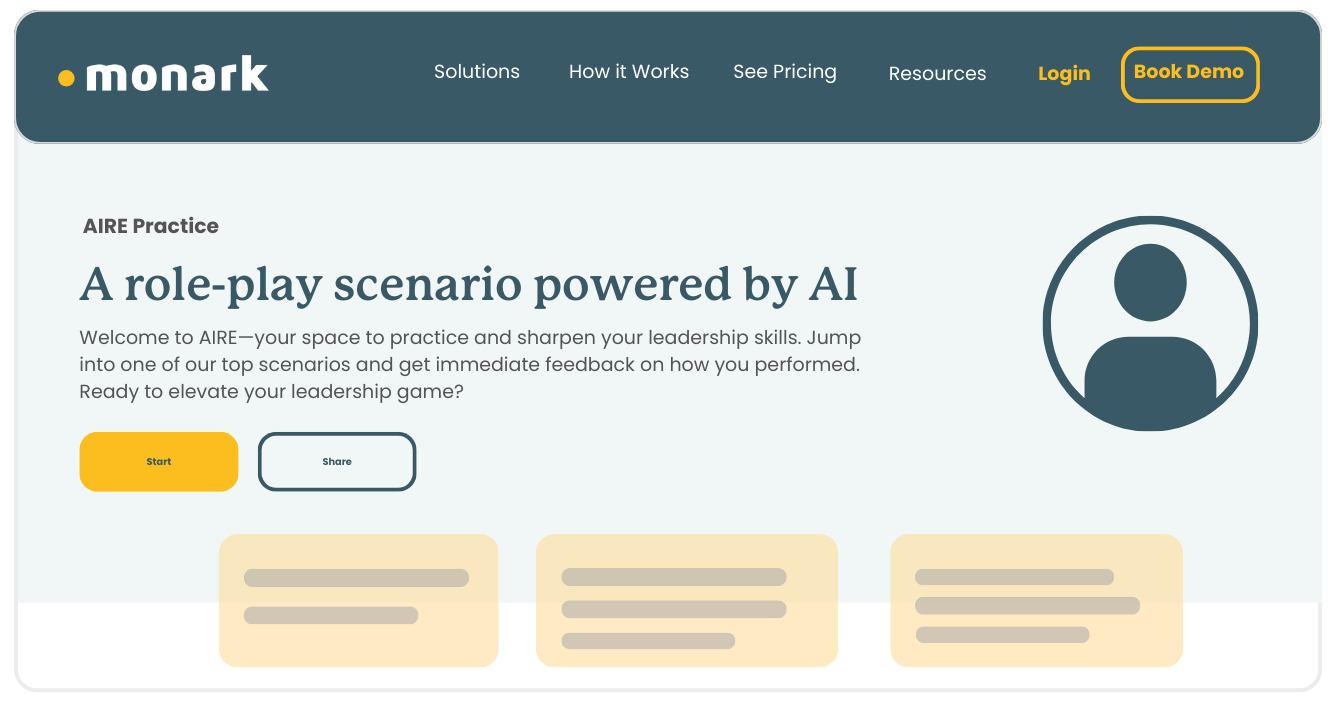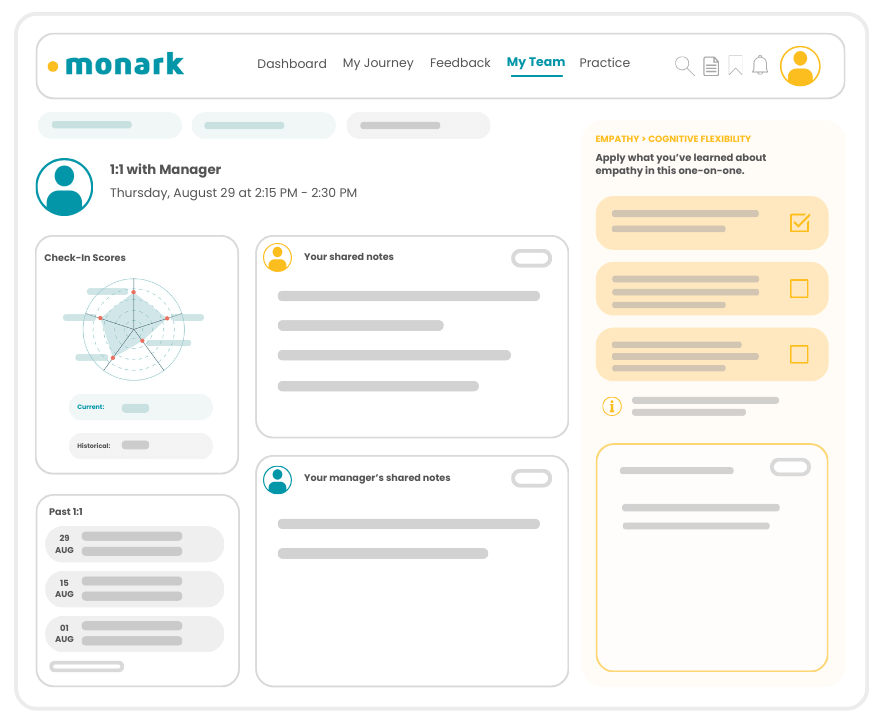
How to Make Performance Reviews Bearable: A Manager’s Guide

Tired of reading? Listen instead:
It’s that time of year again: performance review season. Many managers are now faced with the task of providing formal feedback to their direct reports. For some, this process is straightforward, but for many others, it can be a source of stress and anxiety. After all, performance reviews are not only about assessing an individual’s work but also about maintaining trust, motivating improvement, and fostering open communication. However, each of these components can bring up distinct challenges. We’ve compiled a few strategies below to help you show up as the leader you know you can be, making this necessary task less daunting and more effective.
Monark’s TL;DR
- Performance reviews can be daunting, but they need not be.
- Be open to changing review dates and times to ensure both you and the person receiving feedback can go in with a positive mindset.
- Ensure your review is a two-way conversation instead of a one-sided evaluation. This is critical to fostering a mutual understanding and gaining buy-in on needed improvements.
- Provide specific examples instead of generalizations when providing feedback. This helps provide clarity on what individuals should or should not be doing and makes links to critical outcomes easier to highlight.
- Don’t leave performance a mystery. Provide individuals with ongoing feedback throughout the year, allowing performance reviews to not come as a surprise.
Acknowledge the Challenge & Hold Space for Emotions
Let’s face it—performance reviews can be tough. Even the most seasoned managers can feel apprehensive about delivering feedback, especially when it’s not all glowing praise. It’s normal to feel nervous, whether you’re worried about how your words will be received or concerned about maintaining a positive relationship with your team. However, keeping emotions in check during these situations and being honest with yourself that negative reactions might be had is important.
One way to ensure both you and your team are mentally prepared for important conversations is to be open to flexible conversation times. Reschedule when tight deadlines or personal matters come up; you don’t want the tense client meeting you were just in or a direct report’s worries over a sick kid at home adding to an already stressful conversation. As long as you communicate with your team that meeting times may be shifted after being set and explain that the idea of doing so is to benefit both parties, encouraging team members to reach out if they need a change of date or time, you can curtail any additional negative emotions connected to an unexpected shift.
Practice Good Communication
Effective communication is the foundation of a successful performance review. It starts with setting the right tone from the beginning: be positive, clarify your desire to have a conversation that helps your direct report develop, and acknowledge any concerns brought up. You’ll know you’re on the road to success if your conversation becomes a two-way dialogue instead of a one-sided evaluation. You’ll certainly want to bring up evaluation-style statements (and they’ll be expecting you to) but actively listening to your employees’ perspectives and encouraging them to share their thoughts on their own performance, challenges, and career aspirations will lead to a much more productive conversation. It not only provides you with more information but creates space for your report to reflect on what you’ve shared and for you both to collaboratively identify ways to grow in identified areas for improvement (increasing the likelihood that employees will actually commit to them).
 Communication though is always easier said than done though, and it can be difficult to prepare for unexpected questions or rebuttals. Responding to them, especially in the heat of the moment, can be even more challenging. That’s why roleplaying challenging feedback conversations can be beneficial. In order to practice a real-time feedback conversation and receive actionable recommendations for how to improve check out Monark’s AI roleplay feature, AIRE (you can try out one of our feedback scenarios for free as many times as you’d like, allowing you to improve key feedback skills prior to meeting with your team). Enabled with both chat and live call interaction types, you can test your skills in both a situation with ample time to consider and craft a response that you’d like to provide a team member and one where you’re forced to produce an answer on the spot emulating a real call with someone on your team.
Communication though is always easier said than done though, and it can be difficult to prepare for unexpected questions or rebuttals. Responding to them, especially in the heat of the moment, can be even more challenging. That’s why roleplaying challenging feedback conversations can be beneficial. In order to practice a real-time feedback conversation and receive actionable recommendations for how to improve check out Monark’s AI roleplay feature, AIRE (you can try out one of our feedback scenarios for free as many times as you’d like, allowing you to improve key feedback skills prior to meeting with your team). Enabled with both chat and live call interaction types, you can test your skills in both a situation with ample time to consider and craft a response that you’d like to provide a team member and one where you’re forced to produce an answer on the spot emulating a real call with someone on your team.
Provide Specific Examples
One of the most common pitfalls in performance reviews is relying on generalizations. They leave those receiving feedback confused and often unconvinced that what you’re seeing is actually present in their work. To make your feedback meaningful, be sure to back up your observations with specific examples. Highlight particular projects, tasks, or situations that illustrate the points you want to make. Specific examples make your feedback tangible, relatable, and easier to act on, while also reducing the risk of misunderstandings or defensiveness.

They also make explaining the big picture impact of specific behaviors easier to illustrate. Consider telling someone ‘You’ve been disorganized and this ends up making the team upset’ vs ‘There have been instances where you were disorganized. One example was the Castor project. You missed a critical deadline that caused the rest of the team to have to work overtime, with some ending up late on their own respective timelines due to having to shift dates around.’ If you’re able to connect feedback to larger organizational gains or losses this is even more helpful to frame why what’s being brought up by you is in fact vital and not simply you attempting to nitpick.
Give Consistent Feedback Throughout the Year
Performance reviews should never be a surprise. Providing regular feedback throughout the year is crucial to avoid the dreaded “once-a-year” conversation where everything comes out all at once, and can be key when it comes to retaining your top performers. While it might seem too late to implement this action now – it really never is, and the sooner you start the better you’ll be set up to not just tackle your upcoming performance reviews but all those that come after. You should aim to have regular check-ins where you discuss progress, address challenges, and celebrate wins (if you already have regular 1:1s on the books, one easy way to ensure you make time for this is to set aside half of your time once every three or four meetings to focus on long-term goals). This not only makes the annual review less intimidating but also allows you to address issues in real-time, guiding employees while their memory is still fresh and providing them the opportunity to demonstrate their capacity for growth before performance reviews come around.
Having these conversations is also critical to providing you with a backlog of data to base your performance reviews on when the time comes. Conducting such feedback conversations and taking notes or utilizing a notetaker will assist in documenting the specific examples we touched on before, minimizing the likelihood of individuals claiming ratings are personal in nature or of you accidentally allowing a recent step-up or win from overshadowing more long-term performance. Monark’s upcoming 1:1 Meeting Tool helps with just that. Enabled with an AI notetaker, it will not only provide detailed notes for each meeting but also create monthly reports for each of your 1:1s, enabling you to quickly review what was discussed and worked on when review season comes up. For even more tips on running productive and helpful 1:1s check out our blog post, Leading Through Conversation: Using 1:1s to Help Both You and Your Direct Reports Reach Your Objectives.
A Final Note
Like any good performance review should, we want to end this blog post on a positive note. Remember that performance reviews do not need to be dreaded events. They’re a chance to show your employees that you see them, value their contributions, and are invested in their growth – providing you the opportunity to further build trust and strong relationships with your team. By approaching the process with empathy, preparation, and a genuine desire to help, you can effectively transform a daunting task into a meaningful conversation that drives real improvement and connection.
Are you an organizational leader looking to help your managers ace performance review season? Prepare them with our course on Leading High Achieving Teams.


